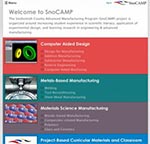
Snohomish County Advanced Manufacturing Project (SnoCAMP)
http://www.snocamp.org
The Snohomish County Advanced Manufacturing Project (SnoCAMP) is an organized partnership between Snohomish School District and Everett Community College. The project is designed to provide middle and high school students access to advanced equipment, offer professional development for teachers, and engage young students, exciting them to study STEM fields. These efforts will increase the relevance of advanced manufacturing education to more closely reflect modern manufacturing practices while creating opportunities in the areas of engineering and manufacturing in community college and high school programs. SnoCAMP’s efforts are also designed to increase the numbers of students (including underrepresented students) in the aerospace, marine, biomedical, and manufacturing arenas, preparing them to enter the workforce at several certificate and degree levels.




